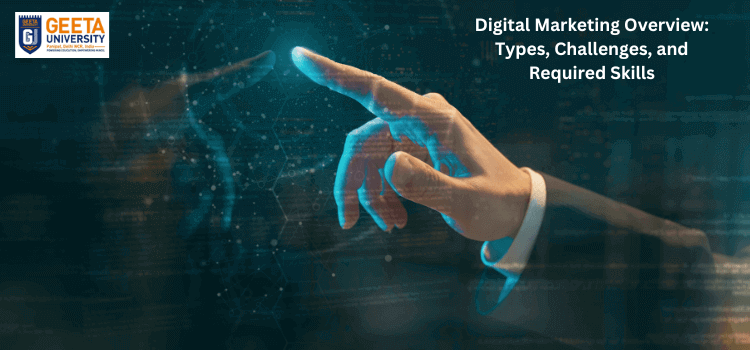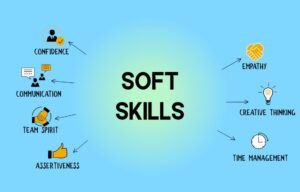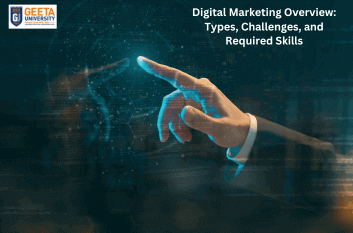Digital Marketing Overview: Types, Challenges, and Required Skills – Geeta University
Uncategorized Best Career Options in geeta university, best college, best diploma university in haryana, Best engineering College in Haryana, best Law college in Haryana, best mba college in haryana, best MCA college in haryana, Best University for BCA in Haryana, Best University in Haryana, Geeta University, Uncategorized
Digital Marketing Overview: Types, Challenges, and Required Skills – Geeta University
In today’s fast-paced digital world, businesses are increasingly leveraging the power of digital marketing to reach and engage with their target audiences. Digital marketing has emerged as a crucial aspect of modern marketing strategies, offering a wide array of opportunities and challenges. In this blog, we will provide an overview of digital marketing, including its types, challenges, and the essential skills required to excel in this dynamic field.
Types of Digital Marketing :
Digital marketing encompasses various types of marketing techniques that are executed through digital channels. Some of the common types of digital marketing include:
Search Engine Optimization (SEO): SEO involves optimizing a website’s content and structure to improve its visibility on search engine result pages (SERPs). It focuses on organic, non-paid search results and includes keyword research, on-page optimization, technical SEO, and link-building strategies.
Pay-Per-Click (PPC) Advertising: PPC advertising allows businesses to place ads on search engine result pages and pay only when users click on their ads. Popular PPC platforms include Google Ads, Bing Ads, and social media advertising platforms like Facebook Ads and Instagram Ads.
Social Media Marketing: Social media marketing involves promoting products or services on social media platforms such as Facebook, Twitter, Instagram, LinkedIn, and YouTube. It includes creating and managing social media profiles, posting engaging content, running paid ad campaigns, and engaging with followers.
Content Marketing: Content marketing focuses on creating and distributing valuable content to attract and engage target audiences. It includes creating blog posts, articles, videos, infographics, and other forms of content to establish authority, drive traffic, and generate leads.
Email Marketing: Email marketing involves sending targeted messages to a group of individuals who have opted-in to receive emails from a business. It includes creating email campaigns, designing newsletters, and automating email workflows to nurture leads and build customer relationships.
Influencer Marketing: Influencer marketing leverages influential individuals on social media to promote products or services. It involves identifying relevant influencers, establishing partnerships, and creating content that resonates with their audience to drive brand awareness and sales.
Challenges in Digital Marketing :
While digital marketing offers significant benefits, it also presents several challenges that digital marketers need to overcome. Some of the key challenges in digital marketing include:
Constantly Evolving Landscape: Digital marketing is a rapidly changing field, with new technologies, platforms, and trends emerging frequently. Digital marketers need to stay updated with the latest developments and adapt their strategies accordingly to remain effective.
Competition and Saturation: The digital space is highly competitive, with businesses vying for attention from the same target audience. It can be challenging to cut through the noise and stand out, especially in saturated markets.
Data Privacy and Security: Digital marketing involves collecting and analyzing data, which raises concerns about privacy and security. Compliance with data protection regulations such as GDPR and CCPA is essential, and digital marketers need to ensure that their strategies comply with these regulations.
Ad Blocking and Ad Fraud: Ad blocking software and ad fraud can impact the effectiveness of digital marketing efforts. Ad blockers prevent ads from being displayed, while ad fraud involves fraudulent activities such as fake clicks or impressions that can waste marketing budgets.
Measuring and Proving ROI: Measuring the effectiveness of digital marketing campaigns and proving their return on investment (ROI) can be challenging. Digital marketers need to implement tracking mechanisms, analyze data, and demonstrate the impact of their efforts to stakeholders.
Required Skills for Digital Marketers :
To excel in the field of digital marketing, professionals need to possess a diverse skill set. Some of the essential skills for digital marketers include:
Digital Marketing Strategy: Digital marketers need to have a strategic mindset and be able to develop comprehensive digital marketing strategies that align with business objectives, target audience, and budget allocation. They should be proficient in identifying the right digital channels, setting goals, and creating action plans to achieve them.
Content Creation and Marketing: Creating compelling and engaging content is a critical skill in digital marketing. Digital marketers should be able to create various types of content such as blogs, articles, social media posts, emails, videos, and more. They should understand content marketing best practices, including content optimization, distribution, and promotion.
Data Analysis and Interpretation: Data plays a crucial role in digital marketing, and digital marketers should be skilled in analyzing and interpreting data to gain insights and make data-driven decisions. They should be proficient in using digital analytics tools to track and measure the performance of marketing campaigns, identify trends, and optimize strategies accordingly.
Social Media Management: Social media is a prominent platform for digital marketing, and digital marketers should be well-versed in managing social media accounts, creating engaging content, running paid ad campaigns, and analyzing social media metrics. They should also stay updated with social media trends and algorithms to optimize social media strategies.
Search Engine Optimization (SEO): SEO is a fundamental aspect of digital marketing, and digital marketers should have a solid understanding of SEO best practices, including keyword research, on-page optimization, technical SEO, and link-building strategies. They should be able to optimize websites to improve search engine rankings and drive organic traffic.
Paid Advertising: Digital marketers should be skilled in managing paid advertising campaigns on platforms like Google Ads, Bing Ads, and social media advertising platforms. This includes creating and managing ad campaigns, setting budgets, targeting the right audience, and optimizing ads for maximum performance.
Creativity and Innovation: Digital marketing requires creative thinking and innovation to stand out in a competitive landscape. Digital marketers should be able to come up with fresh ideas, think outside the box, and experiment with new strategies and tactics to achieve marketing goals.
Conclusion:
Digital marketing is a rapidly evolving field with immense potential for businesses to reach and engage with their target audience. However, it also presents challenges that digital marketers need to overcome through their skills and expertise. Having a solid understanding of different types of digital marketing, staying updated with the latest trends and technologies, and possessing essential skills such as strategic thinking, content creation, data analysis, social media management, SEO, paid advertising, creativity, and innovation can help digital marketers excel in their careers. By continuously learning from the top institution in India, adapting, and optimizing strategies, digital marketers can harness the power of digital marketing to drive business success in the digital age.
If you like it, then keep reading the top university in Delhi, NCR viz. Geeta University’s blogs!!!
- By Payal Jaglan
Related Posts
The Role of Feedback in Personal and Professional Growth
The Role of Feedback in Personal and Professional Growth Business is the middle name of the MBA. Top colleges in India for management studies groom their students for holistic business management. Colleges and Universities offer the best MBA courses to

Essential Management Skills Every Student should Develop
Essential Management Skills Every Student should Develop In the world that we live in, which is both fast-paced and dynamic, it is absolutely necessary to exhibit excellent management abilities in order to achieve success in both the academic and professional
Tall Timber Structures: Pioneering Sustainable Skyscrapers for the Future
Tall Timber Structures: Pioneering Sustainable Skyscrapers for the Future The global construction industry is at a critical juncture as it faces increasing pressure to adopt more sustainable practices and reduce its environmental impact. Traditional building materials like steel and concrete,



